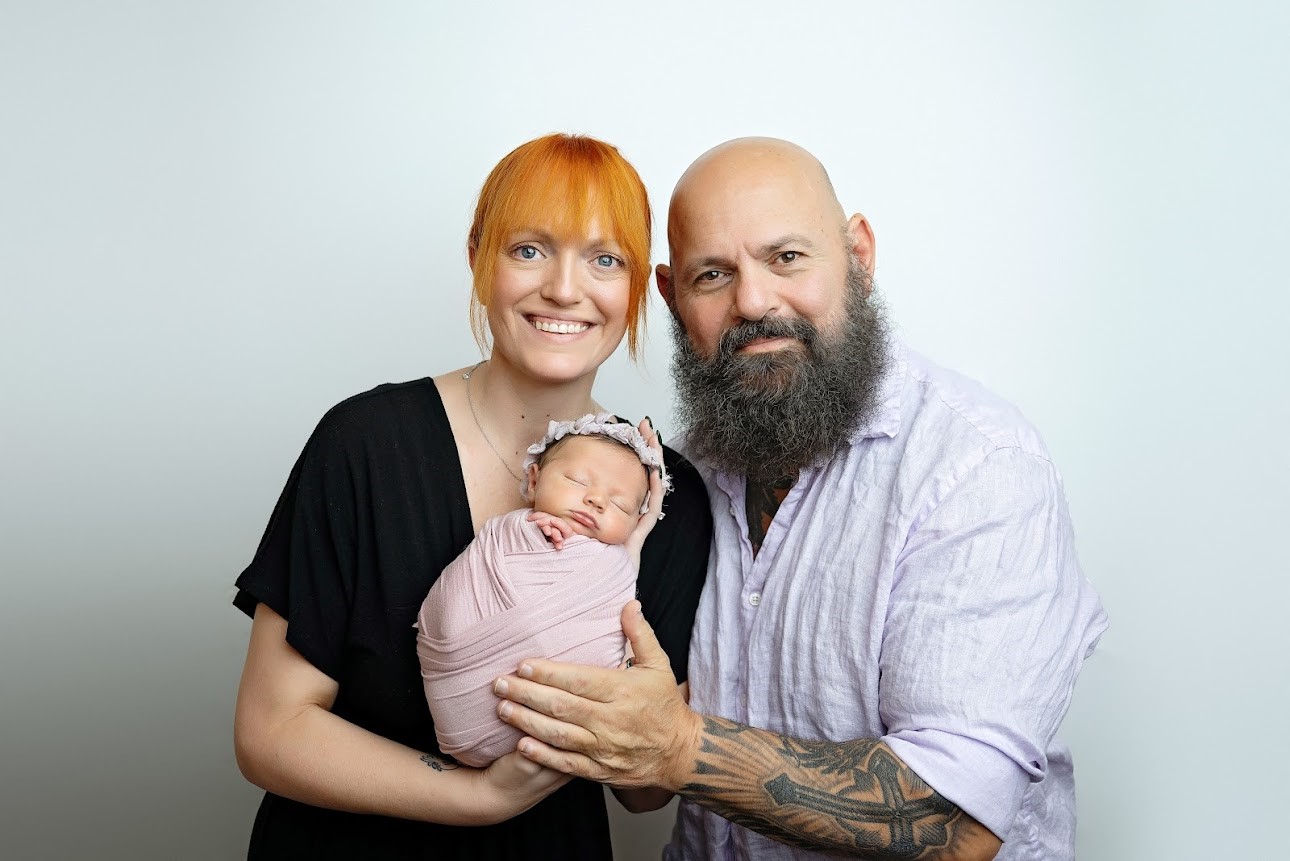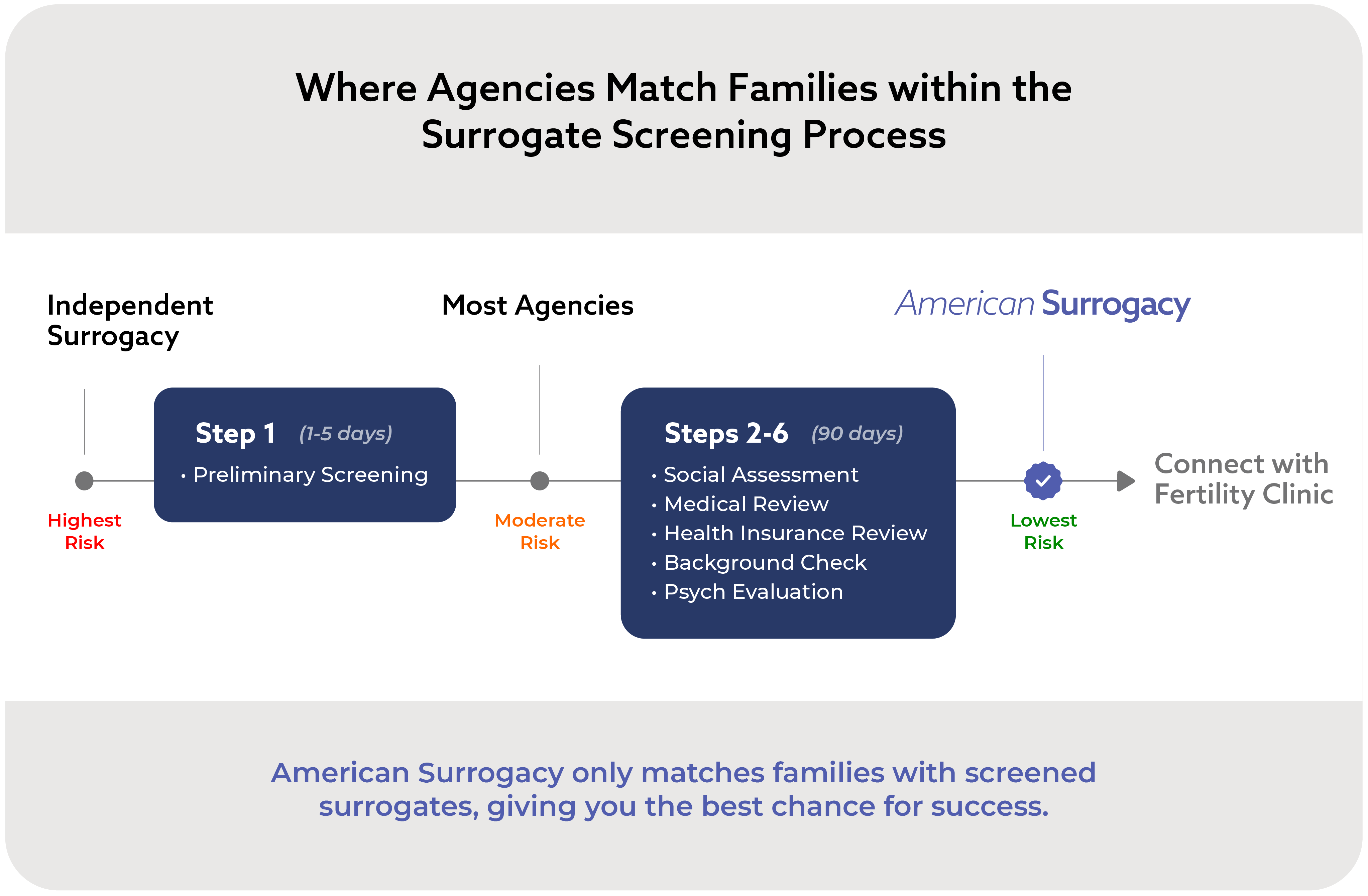Three Main Factors That Influence Wait Times
Surrogacy wait times depend on three primary factors:
More marketing to reach more surrogates. Limiting the number of waiting families. Surrogate screening
To ensure your success and avoid waiting longer to become a parent, these three factors directly impact your surrogacy journey. We’ll explain how marketing to reach more surrogates, the number of families waiting and the importance of screening affect your wait time.
You can also contact us anytime to learn more about your wait time and taking the next step to get started on your journey to parenthood.
More Marketing to Reach More Surrogates
To find highly qualified surrogates, an agency needs access to a larger pool of candidates, which requires investing heavily in marketing.
It can be tempting to choose a surrogacy journey that offers little to no marketing, but these surrogacy paths often lead to increased wait times:
- Independent Surrogacy: Families may attempt to find surrogates on their own—often a friend or family member—to avoid matching fees. However, 98% of surrogates don’t qualify, and independent surrogacy frequently leads to failed screenings and the need for agency assistance.
- Agencies With Limited Marketing: Smaller agencies with fewer resources may work within a limited pool of candidates, making it harder to find a qualified match. These agencies often:
- Work with fewer surrogates.
- Have less access to qualified candidates.
- Conduct limited prescreening before matching.
These limitations increase the risk of not finding a suitable surrogate, leading to longer waits and higher costs due to failed matches.
You don't deserve to wait any longer than you have to, which is why we invest in marketing and outreach to help our families match within 1 - 4 months.

2 Months

1 Month

3 Weeks
Limiting the Number of Waiting Families
The number of families competing for a match is a significant factor in determining wait times. Many agencies do not balance their list of families with the number of available surrogates, resulting in extended wait times and added stress for families.
For instance:
- Some agencies may have over 100 families on their list but complete only 30-40 matches annually, leading to wait times exceeding two years.
- Even agencies that aren’t completely unbalanced can’t offer low wait times because their pool of qualified surrogates is too small.
- This means families often face unnecessary delays, costing them valuable time and prolonging their journey to parenthood.
At American Surrogacy, we prioritize maintaining a balanced, near 1:1 ratio of families to surrogates. This careful approach keeps wait times between 1 to 6 months on average, allowing families to move forward with their surrogacy journey more efficiently and without unnecessary delays.
Why Prescreening Surrogates Matters
Another critical factor is the level of prescreening done before matching. Comprehensive prescreening, which takes 90 days, reduces the risk of disqualification later, preventing years of waiting. At American Surrogacy, all surrogates are thoroughly screened before matching, including:
Meeting American Society for Reproductive Medicine (ASRM) guidelines. A complete social and past pregnancy medical review conducted by an on-staff registered nurse. Background checks. Health insurance review. A psychological evaluation.
Agencies that don’t thoroughly prescreen pose two risks:
- Longer wait times while the surrogate is screened after matching.
- The possibility of disqualification, forcing a restart and adding years to your journey.
Why do they match you with surrogates who are not fully screened?
- They can’t or don’t want to cover the costs of a thorough screening.
- They are more focused on enticing families with little to no upfront fees.
- In independent journeys, they aren’t providing matching services, leaving you with the burden of screening your surrogate.
Here is an example of where families are being matched relative to how much screening their surrogate has undergone in independent journeys and when working with most other agencies compared to American Surrogacy.

In worst-case scenarios, intended parents may wait 2 to 4+ years before even starting the embryo transfer process due to poor prescreening and lack of qualified surrogates.
How to Protect Yourself from Long Waits
A good surrogacy agency prioritizes your success. There are three key things you can do to make sure you’re working with the right professional:
- Choose an agency with broad outreach to surrogates. A portion of your fees should go toward marketing to find surrogates.
- Select an agency that balances the number of surrogates and waiting families.
- Learn about an agency’s prescreening process. Ask for clear information on their screening standards.
On the other hand, here are two key steps to avoiding extended delays:
- Don’t assume wait time estimates are accurate without verifying.
- Ask agencies how they calculate their estimates to ensure you're getting realistic numbers.
How We Keep Wait Times Low
We are committed to helping you start your family as quickly as possible by:
We invest heavily in marketing to reach more surrogates and prescreen the best candidates before matching. All surrogates meet ASRM guidelines before matching, meaning your surrogate is ready to proceed without further delay. We maintain a near 1:1 ratio of families to surrogates, ensuring no family waits longer than six months.
By working with a larger pool of prescreened, qualified surrogates and carefully managing the number of families, we significantly reduce wait times and help you avoid the stress and costs associated with long delays or failed matches.
We Can Help You With Independent Surrogacy
If you’ve identified a surrogate and are pursuing an independent journey, we have a program that can help you thoroughly screen your surrogate and receive the help and support you deserve throughout your journey.
Questions to Ask Your Surrogacy Agency
To protect yourself from long waits, ask these important questions:
What is your average wait time for a surrogate match? How do you calculate your wait time estimates? What percentage of your surrogates are prescreened before matching? How do you ensure a balanced ratio of surrogates to waiting families? What marketing strategies do you use to attract surrogates?
These questions can help you choose an agency that minimizes wait times and ensures a smooth, successful surrogacy journey.